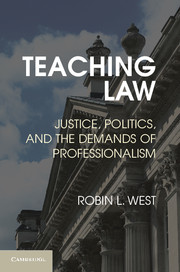Book contents
Some Conclusions
Published online by Cambridge University Press: 05 June 2014
Summary
Are any of the reforms I have suggested in the previous chapters – first, that we invigorate the second-year required curriculum through a series of either required or recommended courses intended to convey the school’s sense of the lawyer’s idealized professional identity; second, that we require that students devote a part of their third year to some sort of experiential learning, whether in clinics, externships or experiential learning courses; and third, that we forthrightly acknowledge and celebrate the pluralistic nature of legal scholarship – possible, within the coni nes of the economic and professional crises the academy now inhabits? Clearly, yes. On scholarship, my primary suggestion is simply that we embrace pluralism, rather than perpetuate the search for legal scholarship’s essence. We should call a halt to the various attempts to locate and excommunicate productive scholars who for some reason are not doing either truly “legal” scholarship, because it is not normative, or not true “scholarship,” because it is normative. An embrace of pluralism does not cost a dime, although it concededly does not look to cut costs by simply lowering the production of scholarship from the legal academy’s mission so as to lower the price tag of a legal education, as a number of law school critics have urged us to do. I have also argued that we should revalidate the part of the academy’s work – traditional doctrinal scholarship – that is most aligned with the needs of the bar and bench, albeit with a call to deepen its critical reach, and that we at the same time revalidate the multiple forms of interdisciplinary work, from both the social sciences and the humanities, that have so enriched the academy over the last twenty or thirty years. That likewise would not cost us anything.
- Type
- Chapter
- Information
- Teaching LawJustice, Politics, and the Demands of Professionalism, pp. 208 - 216Publisher: Cambridge University PressPrint publication year: 2013



